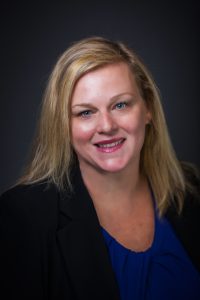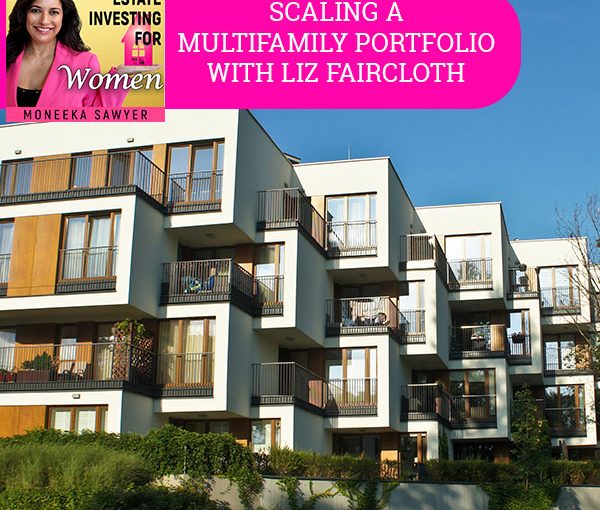Cashflow And Tax Strategies: What The Wealthy Do With Stephanie Walter – Real Estate For Women

What do the wealthy do that makes them wealthy? We find out the answer to that and more in this episode. Moneeka Sawyer is joined by the co-founder of Erbe Wealth, Stephanie Walter. Stephanie talks about breaking away from corporate America and investing in real estate. She also shares insights learned from working with wealthy people, offering great cash flow and tax strategies that can give you the push towards their direction. Tune in to learn more tips from wealthy investors.
—
Watch the episode here
Listen to the podcast here
Cashflow And Tax Strategies: What The Wealthy Do With Stephanie Walter – Real Estate For Women
Real Estate Investing For Women
I am excited to welcome to the show, Stephanie Walter. She is the CEO of Erbe Wealth and a legacy cashflow specialist, capital raiser, syndicator and real estate investor. She has been a financial educator for many years and a real estate syndicator. Stephanie’s passion is teaching people to unlearn what most of us have been wired to think about money and re-educating people on attaining wealth that can be passed on to the next generation. Stephanie, welcome to the show. How are you?
I’m great. Thank you so much for having me.
I am excited about this conversation because there are many myths, ideas and lies that we are taught about money. I hope that’s not too strong a word but it’s awesome to have somebody come on board that’s going to share some of their wisdom around this. Before we get started, could you tell us a little bit about your story like how you got to where you are?
I started like most people into the corporate world out of college and realized not too long thereafter, when I was continually getting these 2% raises that, “This was not for me.” I quit my job and started an insurance agency in 2006. I’ve always loved real estate. I never had much training to it, so I went out and bought a lot of single-family homes and learned by my mistakes and successes on how to do that.
I decided I wanted to scale up in 2016 and get some great education and learn more about possibly buying apartment complexes or commercial real estate. I got into RE Mentor, which is an education program, like getting your Master’s in Real Estate. I did that and completed my first syndication in 2016. After that, I started getting to know people and became a partner with someone who didn’t like to raise money.
I started raising money at that time. Ever since I’ve worked a lot with wealthy people, I and that’s learned a lot from working with them about how they use their money, unlearning everything we’re all taught as fact. I transitioned a lot of my assets, doing what they were doing. I sold my day business, which is insurance and I’m retired. Other than I’ll continue to raise money. I like to teach people about what I’ve learned because I believe my path is definitely doable for everybody.
Could you share with us some of these things that you learned from wealthy people? What is true about wealthy people is they do think differently about money and investing than other people. What’s also interesting is how we define wealthy. I want to give a little bit of my perspective also on this and that. I live in California and people are impressed with the income that we make and the net worth that we have, but for a Californian, we’re upper-middle class.
Wealthy people live in a pretty average house. They drive pretty average cars, but their net worth is pretty impressive. Share on XWe’re not the wealthy around here. The wealthy around here are more like Bill Gates, Bezos and Zuck. Even though I’ve had a huge education in building wealth, my dad was a great mentor even as a young person, but still, I don’t think that I even have that real wealth mindset because I’m not a wealthy person in my community. I’m eager to know about people that define themselves as wealthy. What are those things that they do differently than the rest of us?
What’s interesting about that and you probably know that from where you live is that you’re not always going to recognize a very wealthy person. A very wealthy person, a lot that I deal with, you would never know. They live in a pretty average house and drive pretty average cars but their net worth is pretty impressive. The thing that you noticed by going through their finances pretty clearly is that they invest largely in real estate.
That’s the bulk of their investments. They invest directly in businesses, not in mutual funds. If they invest in the stock, it’s usually, “I got this tip from so-and-so.” It’s almost like their fund money but what they’re very concerned with doing and what they would probably tell you is that cashflow to them is more important than net worth.
There’s a perfect example of what you’re saying in your community is that you’ve got a lot of people that probably have very significant net worth but yet they may be working paycheck to paycheck to keep that lifestyle where it is. Whereas someone who’s wealthy is very concerned with cashflow that the cash flow is building up enough.
It replaces their income so that they can do what they want and love to do to contribute to society. The biggest thing that I learned is that most wealthy people don’t talk a lot about their net worth, even though it probably is pretty impressive but cashflow to them is huge. I learned that lesson myself because I live in Colorado. Colorado’s changed a lot. I started investing here in 2005 and needless to say, the prices have gone up unimaginably.
On paper, I had a very good net worth but I still had to work and continue running my business because I did not have a cashflow strategy in place for this money and I wasn’t very concerned with what my money was doing. Wealthy people know what their money is doing for them. They want the money to be working at all times for them. They view money as a tool that is working for them. That’s a mindset thing.
Until I transition different assets around to see how they were performing and analyzing, “What is my money doing for me?” It was largely inequity and it had a return of zero. To transition that into assets that would pay cashflow, as well as have a good interest rate return, that doesn’t take long to do that to have the goal of having the cashflow for you to be able to be truly wealthy, whatever that looks like for you.

What The Wealthy Do: Most wealthy people don’t really talk a lot about their net worth, even though it is probably pretty impressive, but cash flow is huge.
Talk to me a little bit about how that might translate for people that are not yet wealthy. How can they adopt those mindsets when so much of the time so many of us are living paycheck to paycheck and trying to survive but that wealthy mindset is available to us? Could you talk to us a little bit about that?
That’s another thing that I became pretty aware of when working with wealthy people is that they have a view that money is abundant. That sounds small to people but think about your view on money. Do you view money as, “There’s only so much of it and if I take some money from someone, then I’m making someone else less wealthy?”
They view money as a stream of water and that money is always flowing, abundant and coming. I didn’t probably have a mindset about money but once I did learn about the abundance mindset, I made a point of changing that. That sounds small but if you believe that money is flowing and coming, then it gives you a different perspective on money.
You say that’s small but it’s huge. That mindset tweak is huge. I was explaining this to a friend of mine and I got this image in my head that money is a little bit, rather than being like a stream where it’s inflow, it’s more like a fountain where it comes in, goes up and down, then it comes back in. It’s this circular thing. The power of the pump that makes that go is your willingness to circulate.
I donated to a woman I met $1,000. Everybody else was donating $10. Why did I do $1,000? To me, $1,000 is part of that pump. It’s more going out. That means that more will come in. The pump is stronger because there’s more circulating. Please forgive me. I hope that didn’t sound like a brag. Don’t spend beyond your needs. I’m not saying, “Go spend a ton of money.”
I’m saying that the circulation of money is imperative to creating wealth, community and to uplifting people. Unless money is going out, they are not jobs. Unless those people are not spending, there’s not a community. There’s nothing for us to do together. This is an interactive thing. All of us benefit from the spending and earning of money.
It’s not a zero-sum game this. Even for me, I came home and I was like, “That was such a great visual.” I want a strong pump in that fountain so that the circulation of that wealth is bigger, impacts more, stronger and more fun for me too. I like a powerful fountain. Does that sound right to you or do you feel like something is in there that doesn’t work?
Cash flow is more important than net worth. Share on XThat’s a great analogy. Something that offshoots from is that, granted there are stereotypes and all of that but wealthy people I meet that have been successful are very giving. It’s that same abundance mindset. There’s plenty for me to help you get. What I find very interesting about wealthy people, as opposed to the average person who does the 401(k), is they put their money into this because they’re told that’s what they need to do, a wealthy person invests their money teams of people and ideas.
Let’s use real estate as an example. They find a project that is compelling and interesting. They’ll do their due diligence but they’ll look for a team that has experience who has proven themselves to be successful. Then they’ll put their money into that team, step back and let the team do their thing. They’ll check in on the reports but largely, they’re passive.
Wealthy people invest in business plans and directly in the business. Whereas, us with a 401(k), who knows where our money is invested in? It’s invested in maybe thousands of companies that we know nothing about. They’ll invest their money directly in a business, someone’s business and, “What is this person’s business plan?”
It’s the same thing. They do all their due diligence but they invest directly to people and in people, more than a 401(k) or throwing your money out there and hoping that it grows but you’re not sure what you’re invested in. The wealthy are very conscious of who they’re investing in, where their money is and what it’s doing at all times.
Would you say that approach is true in real estate too for them?
Yes. I find that they don’t want to be the landlord and be managing. They want to understand the exit and business plan for this particular property and then they want to invest in it. They’ll sit back, review the quarterly reports, collect their monthly distributions of cashflow and do the same thing with another investment that comes along.
Talk to me a little bit about debunking these myths. What are those myths that you learned about from these people that we learn the opposite so much of the time?

What The Wealthy Do: Money is always flowing. It’s always flowing, and it’s always abundant. It’s always coming.
I’ve gone over a few of them already but big one is 401(k)s. That might not be a popular subject but I believe that we have to take a look at why we do things and if these things that have been set up for us by I’m not sure who work to our advantage or not. The thing that brought my attention to that is I look over lots of wealthy people and their financial statements. Virtually none had 401(k)s.
That was eye-opening because I was like, “What? I didn’t understand.” It didn’t compute to me. That’s a large myth and then you have to look in more closely. It makes sense because wealthy people want to know what their money is doing at any and all times. They want to know the returns that they’re generating and also what they prepare more than we do for taxes. By not preparing for taxes, that’s a huge thing that the majority of people don’t do.
If someone tells you how much they have in their 401(k), do they have that much in their 401(k)? In twenty years, what is the tax rate going to be and how much of what they have is going to be taxed? To simply not address your tax and mitigate for your taxes, it’s something that the wealthy do all the time. I use the analogy of these two people playing a game of chess and the regular Joe investor is looking one move at a time.
He’s looking, “How are my investments doing? What is the return?” While the wealthy person is looking several moves ahead. They’re checking, “How are my investments doing? On the other hand, what is my exit strategy? How can I mitigate for my taxes?” They’re looking side by side for income and taxes. That is why wealthy people get wealthy.
The myth that I understand there was saving your 401(k), your taxes will be less when you are finally pulling your money out. Don’t worry about that piece. You’re doing a tax-deferred type of program and you’re going to defer it so that you’re paying taxes later. In your experience or from what you’ve seen from the wealthy people, is that true that tax rates will be lower later?
No. Any of us can see what’s happening in our country regardless of what’s happening politically. We know that we’re spending a lot of money and in a lot of debt. People may not know this but our tax rates are on the low side. Historically, they’ve been much higher than they are. We know that the tax rates are going to change in the future. Are you prepared for that?
The tax rates are going to change but I also think that people don’t want to live a lesser lifestyle when they retire. For example, personally, I’m not going to want to retire until I can have the lifestyle that I have now without the work. What does that mean for me? I’ve got this lifestyle with this house and car and this excitement and joy for travel.
Wealthy people know what their money is doing for them. And they want the money to be working at all times for them. Share on XNow I’m not working, so I’ve got more time to travel more, hang out, hopefully take care of my parents more and my own health stuff. If I’m to look at my retirement, I’m going to say, “I need 50% more than what I’m making, at least, in order to continue to benefit from those many years of work.” I don’t want to have my lifestyle go down and be able to afford less.
Whatever my retirement vehicles are, if I’m pulling more than what I’m doing now, even if tax rates stay exactly the same, my tax rate has not gone down. It’s exactly the same. I’m not paying less taxes later but same tax. If the tax rates go up, now you’re paying even more. This whole idea of deferring taxes is an okay strategy.
Be aware that you’re not going to be paying less taxes later. You tell me what you think of this. You have money going in that’s compounding without being taxed, so it happens more quickly. You’ve got more on the backend, supposedly. That’s a compounding and a great investment strategy for growth, possibly depending on what you’re doing with it but it’s not necessarily a tax strategy.
I don’t want to tell everybody to get rid of your 401(k)s. A lot of people are into them but what I do say is be aware of what returns you’re getting. What fees are you paying? I ask a lot of people and they’re not aware of these things. You’ll look at the prospectus and what they’ve made over the last years. Sometimes it’s like 3% or 4% after fees.
I bring that to their attention and they were not aware of that. They’re looking at the long-term of what they think will be projected for them but it’s important to do things that will lower your fees especially, but also get the maximum growth that you can. People try to put off the financial responsibility onto whomever that is, whether that’s your Merrill Lynch person or the 401(k) administrator at your work.
Be more interactive with what’s going on, know what your options are. If you want to take part of your money from your 401(k), there are ways of investing some of that money, setting up a self-directed IRA and investing in real estate. There are other things that you can do and I honestly don’t have a preference but I want people to know that you should be in control and you probably know more than these professionals that are managing your money.
I want to do a deep dive into the analysis of a 401(k). Would you be interested in doing that with me on EXTRA?

What The Wealthy Do: Don’t be afraid to dive in, educate yourself, and learn that there are other investments outside of the stock market.
Sure. Thank you.
I want to dive deep because we have been trained. You’re so funny. You’re like, “I don’t know where that comes from,” and we all know that it was marketing. Somewhere along the way, this marketing trend started but we should not be subject to marketing only. We have the opportunity, with all the financial education that we have out there now to take a look at that. I’d love to do that in EXTRA. Do you have a way for people to reach you?
I get a lot of the same questions asked of me over again. I set up a group of question and answer videos. I keep adding to it every week. Hopefully, I’ll get up to about 100 of the most commonly asked questions. You can go to AskStephanieNow.com and you can get onto my website and look through some of those questions and answers. My actual website is www.ErbeWealth.com. There are tons of content. I find it very rewarding to be able to educate people. I’m constantly updating the content because I view this as my purpose in life. There’s plenty of reports, eBooks and all that great stuff.
I wanted to mention that there is a gift if they go to your website. That website is ErbeWealth.com. Tell us a little bit about one of the free reports people can get.
I have a report. It’s the Investment Report: Five Reasons Passive Investing Might Be For You. It’s a great dive into all the reasons that you may consider an investment that gives you a passive income every month.
Thank you for that. Stephanie, I have three Rapid-fire questions. Give us one super tip on getting started investing in real estate.
A wealthy person invests their money in people. They invest in teams of people. They invest in ideas. Share on XThe biggest tip I can give you is probably a mindset tip that you can do it and not be afraid to get educated. There’s so much information out on the internet about learning these investments that used to be reserved for very wealthy people, banks and insurance companies that are now available to us average people. The only reason that is the case is because of the information available on the internet. Don’t be afraid to dive in, educate yourself and learn that there are other investments outside of the stock market.
What would you say is one strategy for being successful in real estate investing? If you’re already in it, how do you be successful?
It’s setting goals. That’s a simple answer but it is true. When I started, I envisioned, “How could I retire?” I reverse engineered that back to, “How much do I need to come in every month?” From that, then I viewed money that I had and, “What is this money doing for me?” From that, I was able to eventually get enough money to replace my income.
Just having goals, maybe they don’t have to be that big and it’s, “I would like to do one and become alternate investment a year to see how this changes our lifestyle in terms of the passive income and the tax savings that you would get.” Be consistent. Whatever you’re doing, keep at it. I remember when I started investing in real estate, I was like, “I’m going to invest in one single-family home a year.” Have some goals and direction of what you see for your future and then act on it. I see lots of people that talk about it and don’t ever act on it. You go to act on it.
What would you say is one daily practice that you do that contributes to your personal success?
I blocked time for myself. That sounds very simple. Especially if you’re a mom or you’ve got lots of stuff going on. If you can block yourself time, let’s say, “I want to accomplish these three things,” or whatever they are and you know that you get that done every day. That’s going to move you ahead towards your goals.
This show so far has been amazing. Thank you so much for all that you’ve contributed. I can’t wait to get to EXTRA.
Thank you. Me too.
Ladies, stay tuned with Stephanie and me for EXTRA. We’re going to do a deep dive on 401(k)s and why that may not be the best investment for you and for a place to put your money. We’re going to talk about that. If you are subscribed, stay tuned. If you’re not but would like to be, go to RealEstateInvestingForWomenExtra.com.
You get seven days for free. Check it out and then you can stay on board or not. It’s up to you. For those of you that are leaving Stephanie and I, thank you so much for joining us for this portion of the show. I appreciate you and I look forward to next time. Until then, remember goals without action are just dreams. Get out there, take action and create the life your heart deeply desires. I’ll see you soon. Bye.
Important Links
About Stephanie Walters

Love the show? Subscribe, rate, review, and share!
Join the Real Estate Investing for Women Community today:
______________________________________
To listen to the EXTRA portion of this show go to RealEstateInvestingForWomenExtra.com
To see this program in video:
Search on Roku for Real Estate Investing 4 Women or go to this link: https://blissfulinvestor.com/biroku
On YouTube go to Real Estate Investing for Women
Moneeka Sawyer is often described as one of the most blissful people you will ever meet. She has been investing in Real Estate for over 20 years, so has been through all the different cycles of the market. Still, she has turned $10,000 into over $5,000,000, working only 5-10 hours per MONTH with very little stress.
While building her multi-million dollar business, she has traveled to over 55 countries, dances every single day, supports causes that are important to her, and spends lots of time with her husband of over 20 years.
She is the international best-selling author of the multiple award-winning books “Choose Bliss: The Power and Practice of Joy and Contentment” and “Real Estate Investing for Women: Expert Conversations to Increase Wealth and Happiness the Blissful Way.”
Moneeka has been featured on stages including Carnegie Hall and Nasdaq, radio, podcasts such as Achieve Your Goals with Hal Elrod, and TV stations including ABC, CBS, FOX, and the CW, impacting over 150 million people.

